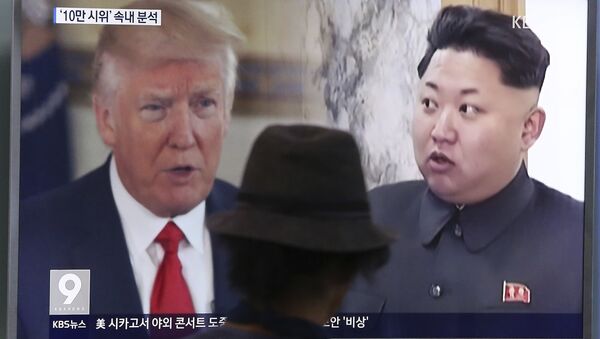MOSCOW (Sputnik), Tommy Yang — After promising to respond to any North Korean missiles targeting the US territory Guam with "fire and fury" in August, Trump once again made threats of military action against Pyongyang during his speech at the United Nations General Assembly on Tuesday.
Trump reiterated that, while the United States had great strength and patience, if forced to defend itself or its allies, the nation would have no choice but to "totally destroy" North Korea. He called North Korean leader Kim Jong Un "rocket man" and accused him of being on a "suicide mission for himself and for his regime."
'We will totally destroy your nation': Trump tells #NorthKorea at #UNGA2017 https://t.co/Jq2mwXcA12 pic.twitter.com/B2UAsGLTnA
— Sputnik (@SputnikInt) September 20, 2017
North Korea's National Strategy
Long-time observers of North Korea argued that Pyongyang’s plan to develop nuclear weapons did not come as a result of external provocations, as the goal of becoming a nuclear power has been in the country’s national strategy for a long time.
"The development of North Korea’s nuclear arms program is not a result of provocations from outside. Without external provocations, North Korea would still have developed its nuclear weapons. No matter if it faces provocations or not, North Korea has set the goal of becoming a nuclear power as part of its national strategy. Provocations would only trigger strong verbal responses from it. But the development of its nuclear program is not impacted by external provocations," Zhang Liangui, an expert on North Korea at the Central Party School, which trains Chinese officials in Beijing, told Sputnik.
DETAILS: The missile was fired from #Pyongyang in #NorthKorea, heading east https://t.co/XXoPlNbdEG #Japan pic.twitter.com/7rX66T197V
— Sputnik (@SputnikInt) September 14, 2017
North Korea withdrew from the Treaty on the Non-Proliferation of Nuclear Weapons (NPT) in 2003 and conducted its first underground nuclear test as early as 2006.
The Beijing-based expert pointed out that the history of North Korea’s nuclear program showed that Pyongyang had always followed its plans of developing nuclear weapons, regardless of what kind of provocations it faced.
"Even when North Korea was participating in the six-party talks or trying to negotiate with the United States before, that [the peace talks] was only the responsibility of the country’s foreign ministry, which has completely different functions from the North Korean military departments responsible for the development of its nuclear programs. They [different government departments of North Korea] are just fulfilling their own jobs," Zhang said.
Quick End to Possible Military Conflict
Compared to the Korean War in the 1950s, which lasted over three years, any military conflict on the Korean Peninsula today could end very quickly, the Chinese scholar suggested.
"Decades have passed. Warefare today is totally different from what it was in the 1950s. If you call the war in the 1950s first generation warfare, what we face today can be called fourth generation warfare. The United States is capable of finishing the war [on the Korean Peninsula] with a minimal number of casualties," Zhang said.
He noted that US Defense Secretary James Mattis previously explained that the United States has military strategies in place for dealing with North Korea that would protect its allies, including South Korea’s capital Seoul, which is widely expected to suffer a large number of casualties in case of a counterattack from Pyongyang.
"As the US defense secretary, I believe he won’t make empty comments, without plans to back them up," Zhang said.
Despite strong opposition from China and Russia against military actions on the Korean Peninsula, both Beijing and Moscow would hesitate to come to Pyongyang’s rescue, as they did in the 1950s, in the event of a strike on North Korea by the United States, the Beijing-based expert argued.
"It’s normal for both China and Russia to express their strong position before any warfare takes place. But in case the United States takes military actions, I believe both China and Russia are not capable of stopping any US military actions. Even if they take the risk of a nuclear war with the United States to prevent such an attack, what will the result be? It will be a nuclear North Korea that has survived. Does this fit the interests of both China and Russia? I believe policymakers in both China and Russia understand this very well," Zhang said.
New Challenge for North Korea
South Korean experts argued that Trump’s harsh rhetoric on taking military actions against Pyongyang could present a new challenge for the North Korean leadership.
"President Trump was unequivocal in his statement that he would destroy the country. North Korea now has a choice. I don’t think they have ever been pushed this far. This is a very serious situation right now. I don’t think North Koreans are thinking hard enough about what kind of repercussion they’ll be met with. It all depends on Pyongyang and what they decide to do," James Kim, an international relations expert at the Asian Institute for Policy Studies in Seoul, told Sputnik.
US experts suggested North Korea listen to demands from the international community to avoid total destruction.
"The Democratic People’s Republic of Korea had better comply to the UN world demands or face elimination as a viable civilization on this planet because of its threat to all humanity as an authoritarian state," Charles Vick, an expert on the North’s missiles and a senior analyst at GlobalSecurity.org, a private research group in Alexandria, Virginia, told Sputnik through email.
The US expert added that the Republican Party is known for knocking down tyrants throughout history and warned that they would do it again if required.
#Japan moves #missile interceptor under flight paths of North Korean missiles https://t.co/unHuhSPqrP #NorthKorea pic.twitter.com/pxmUHYTvX7
— Sputnik (@SputnikInt) September 21, 2017

